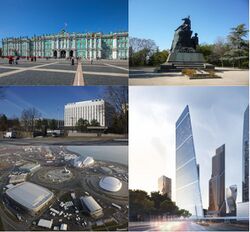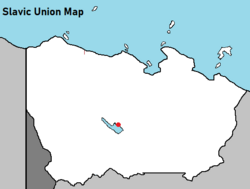Osipovgrad: Difference between revisions
Jump to navigation
Jump to search
Slavic Union (talk | contribs) No edit summary |
Slavic Union (talk | contribs) No edit summary |
||
| Line 7: | Line 7: | ||
| image_alt = | | image_alt = | ||
| image_caption = From top to bottom starting at left, [[Vozhd Palace]], State Duma Building, Osipov Stadium Grounds, Statue of Nikifor Osipov, Osipov Tower | | image_caption = From top to bottom starting at left, [[Vozhd Palace]], State Duma Building, Osipov Stadium Grounds, Statue of Nikifor Osipov, Osipov Tower | ||
| image_flag = | | image_flag = Osipovgrad Flag.png | ||
| flag_alt = | | flag_alt = | ||
| image_seal = | | image_seal = Osipovgrad Coat of Arms.png | ||
| seal_alt = | | seal_alt = | ||
| image_shield = | | image_shield = | ||
| Line 35: | Line 35: | ||
| subdivision_name3 = | | subdivision_name3 = | ||
| established_title = Founded | | established_title = Founded | ||
| established_date = Late | | established_date = Late 4th Century | ||
| founder = | | founder = | ||
| seat_type = | | seat_type = | ||
| Line 94: | Line 94: | ||
| area_code = | | area_code = | ||
| iso_code = | | iso_code = | ||
| website = | | website = osipovgrad.gov | ||
| footnotes = | | footnotes = | ||
}} | }} | ||
| Line 101: | Line 101: | ||
Osipovgrad is the sight of some of the greatest attractions in the nation, such as the [[Vozhds Palace]], which was built from 1945-1948 and is the capital building of the Slavic Union. It is also the site of the majority of Slavic embassies. | Osipovgrad is the sight of some of the greatest attractions in the nation, such as the [[Vozhds Palace]], which was built from 1945-1948 and is the capital building of the Slavic Union. It is also the site of the majority of Slavic embassies. | ||
=Etymology= | |||
Osipovgrad was renamed in 1940 after [[Nikifor Osipov]] made himself [[Vozhd of the Slavic Union]], before this the city was named Adrikagorod after Imperator Adrika II. | |||
=History= | |||
===Prehistory=== | |||
=Geography= | |||
=Cityscape= | |||
=Culture= | |||
=Sports= | |||
=Economy= | |||
=Government= | |||
=Demographics= | |||
=International Relations= | |||
===Twin Towns and Sister Cities=== | |||
Revision as of 04:53, 16 August 2021
Osipovgrad | |
|---|---|
Capital City | |
 From top to bottom starting at left, Vozhd Palace, State Duma Building, Osipov Stadium Grounds, Statue of Nikifor Osipov, Osipov Tower | |
| Nickname: City of Steel | |
 Osipovgrad within the Slavic Union | |
| Country | The Slavic Union |
| Founded | Late 4th Century |
| Government | |
| • Mayor | Volodya Ivanov (PSS) |
| Area | |
| • Urban | 1,135.5 km2 (438.40 sq mi) |
| • Metro | 2,360.5 km2 (911.40 sq mi) |
| Population (2018) | |
| • Capital City | 9,440,000 (1st) |
| Website | osipovgrad.gov |
Osipovgrad is the capital and largest city of The Slavic Union. With a population of roughly 9,440,000 it comprises 34% of the countries population, and is the 13th largest city in the Coalition of Crown Albatross. It is located on the Antonovich lake and was founded in the late 1200s.
Osipovgrad is the sight of some of the greatest attractions in the nation, such as the Vozhds Palace, which was built from 1945-1948 and is the capital building of the Slavic Union. It is also the site of the majority of Slavic embassies.
Etymology
Osipovgrad was renamed in 1940 after Nikifor Osipov made himself Vozhd of the Slavic Union, before this the city was named Adrikagorod after Imperator Adrika II.

